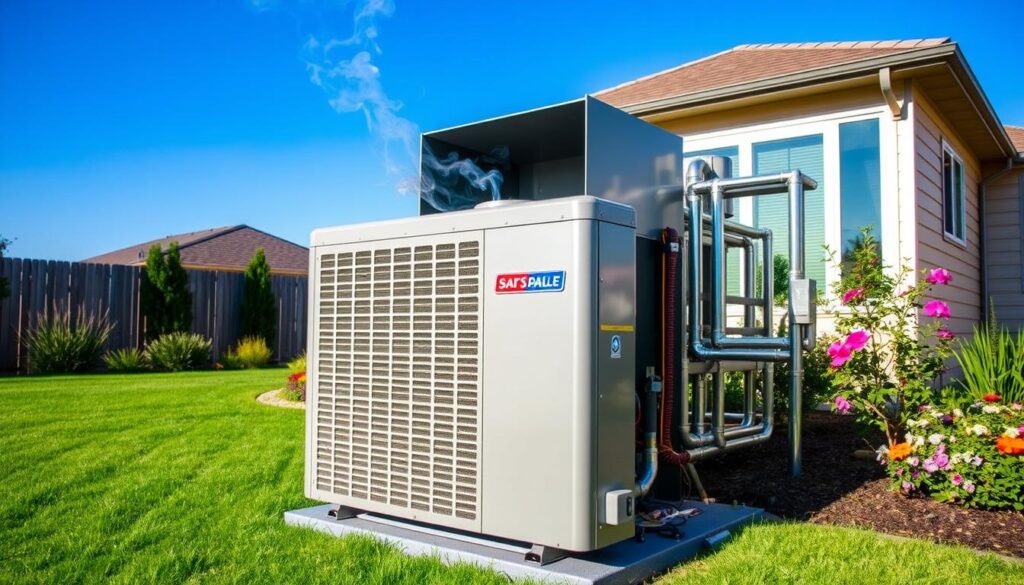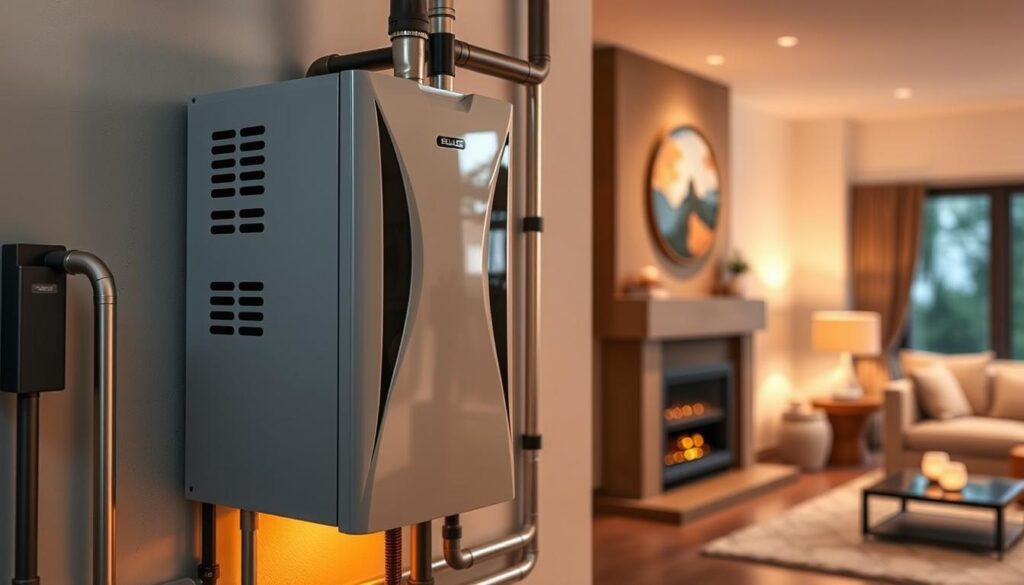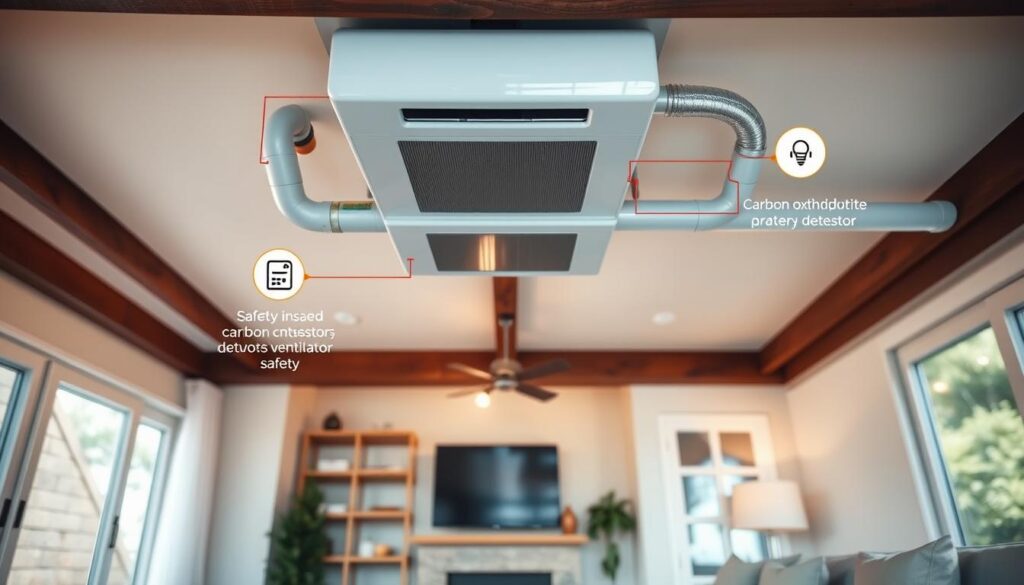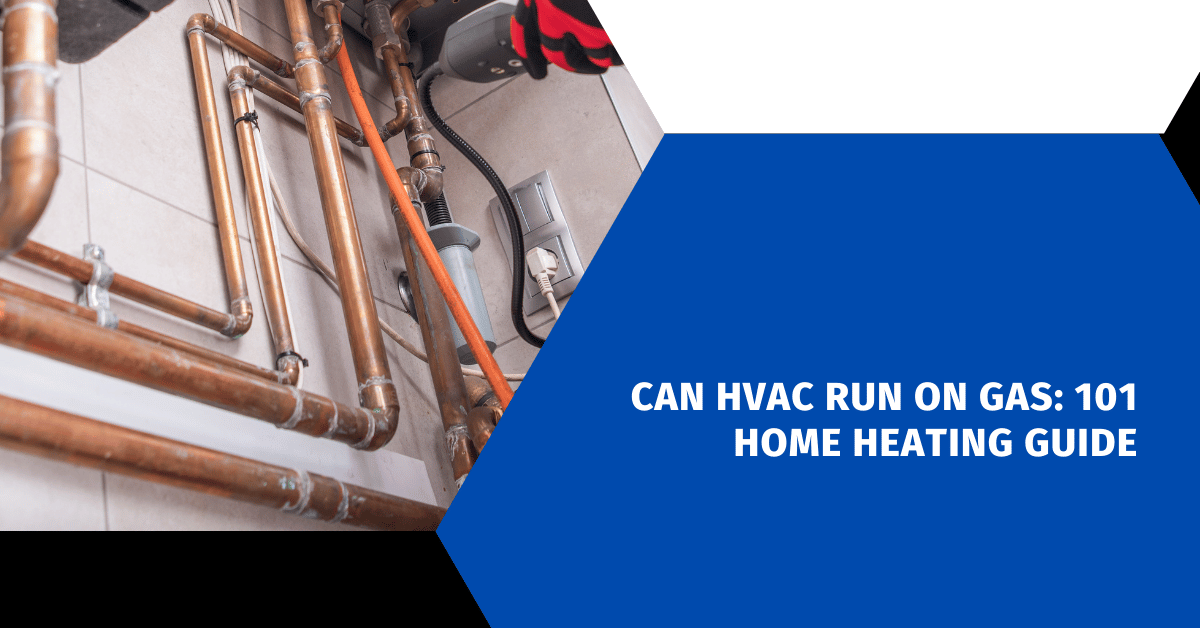Affiliate Disclosure
HVAC Guide Guys is a participant in the Amazon Services LLC Associates Program, an affiliate advertising program designed to provide a means for sites to earn advertising fees by advertising and linking to Amazon.
Can HVAC Run on Gas? When it comes to home heating, many people wonder if HVAC systems can run on gas. The answer might surprise you. It could lead to more efficient, cost-effective, and reliable heating for your home. Let’s dive into the world of gas-powered HVAC systems and see how they can change your home’s comfort, all year round.

Key Takeaways
- Gas-powered HVAC systems offer rapid heating, consistency during power outages, and potential cost savings.
- Understanding the differences between gas and electric HVAC systems is crucial for making informed decisions about your home heating and cooling needs.
- Gas furnaces can reach up to 99% efficiency, making them a highly energy-efficient option for home heating.
- Dual-fuel systems that combine gas and electric technologies can optimize energy use and provide maximum flexibility.
- Factors like climate, home size, and utility costs should be considered when choosing between gas and electric HVAC systems.
Table of Contents
Understanding Gas-Powered HVAC Systems
Thinking about upgrading your home’s HVAC system? You might wonder if a gas-powered system is the best option. Gas-powered systems use natural gas or propane, offering unique benefits and considerations. Let’s explore gas HVAC to help you decide.
Types of Gas HVAC Systems
There are many types of gas HVAC systems, each suited for different homes and climates. The most common include:
- Gas furnaces: These systems heat the air with natural gas or propane, then distribute it through ductwork and vents.
- Gas boilers: These heat water or steam, which is then circulated to warm your home.
- Gas heat pumps: These systems can both heat and cool your home, using gas for heat and electricity for cooling.
Components of Gas HVAC Systems
Gas HVAC systems have some common parts like blower, ductwork, and thermostat. But they also have unique features:
- Burner: The burner ignites the fuel to create heat.
- Heat exchanger: This part transfers heat from the combustion to the air circulated in your home.
- Pilot light or electronic ignition: These are needed to start the burner, either a constant pilot light or an electronic system.
How Gas HVAC Systems Work
Gas HVAC systems work by burning fuel to heat your home. Here’s how:
- The thermostat tells the system to start when it’s cold.
- The burner lights the gas, making hot air that goes through the heat exchanger.
- The blower fan sends the warm air through ductwork to your rooms.
- Cool air is drawn back into the system, starting the cycle again to keep your home warm.
This efficient process makes gas HVAC systems popular, especially in cold climates where they heat quickly.
Explore Our HVAC Shop
Looking for top-rated HVAC tools, parts, and accessories? Visit our shop and find the perfect solution for your needs.
Visit the ShopCan HVAC Run on Gas: Essential Information
Home heating and cooling come in many forms, including gas-powered HVAC systems. These systems use natural gas or propane and are popular where gas lines are available. They often include a gas furnace for heating and an electric air conditioner for cooling.
Gas-powered HVAC systems work well in cold areas and can save money if gas is cheaper than electricity. But, they cost more to buy than electric ones and might need more repairs.
| Feature | Gas HVAC | Electric HVAC |
|---|---|---|
| Upfront Cost | Higher | Lower |
| Repair Frequency | Lower | Higher |
| Heating Effectiveness | Superior in cold climates | Less effective in cold climates |
| Energy Efficiency | Can be more efficient for heating | May be more efficient for cooling |
| Fuel Cost | Lower in regions with affordable natural gas | Lower in regions with affordable electricity |
Choosing between gas and electric HVAC depends on your climate, home size, and energy costs. Homeowners should weigh the pros and cons of each to decide what’s best for them.
Comparing Electric vs. Gas HVAC Systems
Homeowners often struggle to choose between electric and gas HVAC systems for heating. Each has its own benefits and drawbacks. The choice depends on energy efficiency, cost, and environmental impact.
Energy Efficiency Differences
Gas HVAC systems are usually more energy-efficient, especially in cold climates. They heat homes faster and use less energy than electric systems. Gas furnaces can also heat homes more effectively, needing less time to reach the desired temperature.
Cost Comparison Analysis
Installing a gas HVAC system costs more upfront than an electric one. A new gas furnace for a 2,000 square foot home can cost between $4,500 and $6,000. In contrast, an electric furnace costs between $2,000 and $4,000. But, gas systems might be cheaper to run over time because natural gas is often less expensive than electricity.
Environmental Impact Considerations
The environmental impact of electric versus gas HVAC systems is complex. Electric systems are generally seen as more eco-friendly, especially where electricity comes from renewable sources. Gas systems, however, can have a higher carbon footprint due to emissions from burning natural gas or propane.
Choosing between electric and gas HVAC systems depends on your specific needs, budget, and local energy situation. It’s crucial to consider energy efficiency, installation and running costs, and environmental impact. This way, you can make a choice that fits your home and lifestyle best.
“Choosing the right HVAC system is a critical decision that can have a significant impact on your home’s comfort, energy usage, and long-term costs. It’s important to carefully consider all the factors to find the solution that best meets your needs.”
– Logan AC and Heat, a prominent HVAC service provider
Explore Our HVAC Shop
Looking for top-rated HVAC tools, parts, and accessories? Visit our shop and find the perfect solution for your needs.
Visit the ShopBenefits of Gas-Powered HVAC Systems
Gas-powered HVAC systems are great for home heating. They heat up fast and work well in cold places. They also keep your home warm even when the power goes out.
In places where natural gas is cheap, these systems cost less to run than electric ones. This can save you money over time.
Gas furnaces last a long time, up to 20 years. This means you won’t have to replace them often. They also heat your home quickly, which is important in very cold weather.
- Rapid and efficient heating, especially in cold climates
- Consistent heat during power outages
- Lower operational costs in areas with affordable natural gas
- Longer lifespan, with gas furnaces lasting 10-20 years
- Ability to heat spaces quickly during extreme cold events
Gas-powered HVAC systems are not just good at heating. They are also very gas HVAC efficient. Dual-fuel heat pump systems can cut energy use by up to two-thirds. This means lower bills and less harm to the environment.
“Dual fuel heat pump systems can be eligible for up to $2,600 in federal tax credits, making them an attractive option for homeowners looking to maximize the advantages of gas heating and reduce their carbon footprint.”
More and more people are choosing gas-powered HVAC systems. They are efficient, reliable, and can handle changing weather. These systems are set to be a big part of home heating and cooling in the future.

Dual-Fuel HVAC Systems: The Best of Both Worlds
When it comes to heating your home, you have a few choices. You can go with a gas-powered or electric HVAC system. But, there’s another option that’s worth looking into: the dual-fuel HVAC system. It’s a mix of both gas and electric heating, giving you the best of both worlds.
How Dual-Fuel Systems Operate
Dual-fuel HVAC systems use an electric heat pump for heating when it’s mild outside. When it gets colder, they switch to a gas furnace for more heat. This smart switch helps save energy and money all year long.
Temperature-Based Switching Technology
Dual-fuel systems are great because they adjust to the weather. They use the heat pump when it’s above 40 degrees Fahrenheit. When it gets colder, they switch to the gas furnace. This smart switch helps optimize HVAC energy optimization and cuts down on heating costs.
Dual-fuel systems are a smart choice for your home. They combine the clean, cost-effective heat of an electric pump with the reliable warmth of a gas furnace. By using both hybrid HVAC systems and dual-fuel heating, they offer the ultimate in comfort and energy efficiency.
| Feature | Benefit |
|---|---|
| Temperature-based Switching | Automatic transition between heat pump and gas furnace for optimal efficiency |
| Increased Energy Efficiency | Utilizes the most cost-effective heating source based on outdoor conditions |
| Improved Comfort | Combines the comfort of a heat pump with the reliability of a gas furnace |
| Reduced Environmental Impact | Minimizes carbon emissions compared to traditional HVAC systems |
“Dual-fuel systems offer the best of both worlds, combining the energy efficiency of a heat pump with the reliable heating power of a gas furnace.”
Explore Our HVAC Shop
Looking for top-rated HVAC tools, parts, and accessories? Visit our shop and find the perfect solution for your needs.
Visit the ShopSafety Considerations for Gas HVAC Systems
Gas-powered HVAC systems need extra safety checks because of carbon monoxide (CO) leak risks. It’s important to have regular professional inspections. These checks ensure the system burns gas right and vents it properly, spotting and fixing any safety problems.
CO detectors are a key safety feature for these systems. They should be near the HVAC unit and in bedrooms to warn of gas buildup early. Automatic shut-off valves also help by stopping gas flow if a leak is found.
Getting certified technicians to install and maintain these systems is crucial. Homeowners should only let qualified experts handle these tasks. This ensures the systems work safely and efficiently.
Prioritizing Gas HVAC Safety
Here are some key safety considerations for gas HVAC systems:
- Regular Inspections: Annual checks by pros are key to spot and fix safety issues like bad combustion or venting.
- Carbon Monoxide Detectors: CO detectors near the HVAC and in bedrooms warn of gas buildup early.
- Automatic Shut-off Valves: These shut off gas flow if a leak is detected, reducing risks.
- Certified Technicians: Only trust experts for installation, upkeep, and repairs to keep systems safe and efficient.
By focusing on these safety steps, homeowners can enjoy gas HVAC systems’ benefits while lowering risks.

“Proper installation and regular maintenance are essential for the safe operation of gas HVAC systems. Homeowners should always consult with certified professionals to ensure their home heating and cooling solutions are installed and serviced correctly.”
| Safety Measure | Importance | Frequency |
|---|---|---|
| Professional Inspection | Crucial to identify and address potential safety issues | Annually |
| Carbon Monoxide Detectors | Provide early warning of dangerous gas buildup | Install on every level and near sleeping areas |
| Automatic Shut-off Valves | Cut off gas supply in the event of a detected leak | Integrated into the HVAC system |
| Certified Technicians | Ensure proper installation, maintenance, and repair | Whenever service is required |
Explore Our HVAC Shop
Looking for top-rated HVAC tools, parts, and accessories? Visit our shop and find the perfect solution for your needs.
Visit the ShopCost Analysis: Installation and Operation
Choosing between gas and electric HVAC systems often depends on initial costs and long-term expenses. Gas systems might cost more to set up, but they can save money over time. This is especially true in areas with cheap natural gas and cold winters.
Initial Setup Expenses
Getting a gas HVAC system means paying for the furnace, ductwork, and installation. These costs are higher than for electric systems, which need only an air conditioner and air handler. But, the savings from gas heating can make up for the initial costs in cold areas.
Long-term Operating Costs
The costs of running a gas HVAC system depend on local prices and efficiency. In places with low gas prices, gas systems can save a lot on heating bills. Newer gas furnaces are also more efficient, cutting down on long-term costs.
| Factor | Gas HVAC | Electric HVAC |
|---|---|---|
| Installation Costs | Higher | Lower |
| Heating Expenses | Lower | Higher |
| Energy Efficiency | Improved | Varies |
| Maintenance Requirements | Moderate | Relatively Simple |
It’s crucial to look at HVAC installation costs, gas heating expenses, and HVAC operating costs in your area. This will help you choose the best HVAC option for your home.
Maintenance Requirements for Gas HVAC
Keeping your gas-powered HVAC system in top shape is key. It ensures safety, efficiency, and a long life. Regular maintenance is a must for every homeowner with a gas system.
Getting annual professional inspections is a smart move. They help spot gas leaks and make sure your system works right. Technicians will check everything, clean the furnace, and fix any problems.
You can also help keep your system running smoothly. Change air filters often, clear clutter around the furnace, and fix any odd noises or smells right away. Taking care of your gas system can save you money and extend its life.
Working with a trusted HVAC contractor and sticking to a maintenance plan will keep your system working well for years.
Key Maintenance Tasks for Gas HVAC
- Annual professional inspections to check for leaks, clean components, and ensure proper combustion
- Regular air filter replacements to maintain efficient airflow
- Keeping the area around the furnace clear and unobstructed
- Prompt attention to any unusual noises, smells, or other potential warning signs
“Proper maintenance is crucial for the safety and longevity of your gas HVAC system. Investing in annual checkups and taking proactive steps can help you avoid costly breakdowns and ensure your home stays comfortable year-round.”
By focusing on gas furnace maintenance and HVAC servicing, you protect your family and your investment. You also get reliable performance from your gas system for many years.
Explore Our HVAC Shop
Looking for top-rated HVAC tools, parts, and accessories? Visit our shop and find the perfect solution for your needs.
Visit the ShopChoosing Between Gas and Electric HVAC
Choosing the right HVAC system for your home is important. It affects your energy use, costs, and the environment. Knowing about climate and home size can help you pick the best option for you.
Climate Considerations
The climate where you live is key in picking an HVAC system. In cold areas, gas systems are often better because they heat fast. They’re great for homes in cold climates.
In warmer places, electric systems like heat pumps are more efficient. They can heat and cool your home, saving you money.
Home Size and Layout Factors
The size and layout of your home matter too. Big homes might do better with gas systems because they heat fast. Small homes might prefer electric heat pumps for their efficiency and dual function.
Also, think about your area’s infrastructure and utility rates. These can affect your choice between gas and electric systems.
Choosing between gas and electric HVAC systems needs careful thought. Consider your climate, home size, and personal goals. This way, you can find a system that meets your needs and is good for the planet and your wallet.
Professional Installation and Service Requirements
Installing a gas-powered HVAC system needs a pro. It’s not just about putting it in place. It’s about making sure it’s safe and works right. Certified HVAC technicians know how to do this.
They handle the setup, venting, and make sure it meets local rules. This is key for your system to run well and safely.
Keeping your gas HVAC system in check is also important. You need qualified HVAC professionals for this. They do yearly checks, clean it, and fix any problems. If you skip this, your system might not work as well, cost more to run, and could even be dangerous.
So, always go for HVAC professional installation and get experts for upkeep and fixes. Trying to do it yourself can mess up your warranty and risk your safety and the system’s life.
| Importance of Professional HVAC Installation | Importance of Professional HVAC Servicing |
|---|---|
|
|
Working with certified HVAC technicians for both setup and upkeep means you get the most out of your system. It’s about safety, performance, and saving money in the long run.
Conclusion
Gas HVAC systems are great for homeowners who want efficient and reliable heating. They heat up quickly, especially in cold weather, and can save money in the long run. But, it’s important to know about safety and maintenance to use them safely and well.
Choosing between gas and electric heating depends on several things. You should think about your climate, home, local rates, and what you prefer. By looking at energy efficiency, costs, and environmental impact, you can choose the best heating for your home.
Ultimately, the right choice between gas and electric HVAC systems is yours. Talking to HVAC experts can help a lot. They can guide you to find the best heating system for comfort, efficiency, and safety in your home.

